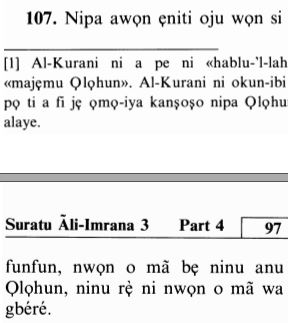3vs107
Select any filter and click on Go! to see results
Yoruba Translation

Hausa Translation
Kuma amma waɗanda fuskõkinsu suka yi fari, to sũ suna cikin rahamar Allah kuma, su a cikinta, madawwama, ne.
Asbabu n-Nuzuul (Occasions of Revelation)
وَأَمَّا الَّذِينَ ابْيَضَّتْ وُجُوهُهُمْ فَفِي رَحْمَةِ اللّهِ هُمْ فِيهَا خَالِدُونَ ﴿١٠٧﴾
And for those whose faces will become white, they will be in Allah's mercy (Paradise), therein they shall dwell forever.
in Paradise, where they will reside for eternity and shall never desire to be removed.
Abu Isa At-Tirmidhi recorded that Abu Ghalib said,
"Abu Umamah saw heads (of the Khawarij sect) hanging on the streets of Damascus. He commented, `The Dogs of the Fire and the worst dead people under the cover of the sky. The best dead men are those whom these have killed.'
He then recited, يَوْمَ تَبْيَضُّ وُجُوهٌ وَتَسْوَدُّ وُجُوهٌ (On the Day (i.e. the Day of Resurrection) when some faces will become white and some faces will become black), until the end of the Ayah.
I said to Abu Umamah, `Did you hear this from the Messenger of Allah?'
He said, `If I only heard it from the Messenger of Allah once, twice, thrice, four times, or seven times, I would not have narrated it to you.'''
At-Tirmidhi said, "This Hadith is Hasan.''
Ibn Majah and Ahmad recorded similarly.
Allah said,
يعني الجنة ماكثون فيها أبدا لا يبغون عنها حولا وقد قال أبو عيسى الترمذي عند تفسير هذه الآية : حدثنا أبو كريب حدثنا وكيع عن الربيع بن صبيح وحماد بن سلمة عن أبي غالب قال : رأى أبو أمامة رءوسا منصوبة على درج مسجد دمشق فقال أبو أمامة : كلاب النار شر قتلى تحت أديم السماء خير قتلى من قتلوه ثم قرأ " يوم تبيض وجوه وتسود وجوه " إلى آخر الآية قلت : لأبي أمامة أنت سمعته من رسول الله صلى الله عليه وسلم قال : لو لم أسمعه إلا مرة أو مرتين أو ثلاثا أو أربعا حتى عد سبعا - ما حدثتكموه ثم قال هذا حديث حسن وقد رواه ابن ماجه من حديث سفيان بن عيينة عن أبي غالب وأخرجه أحمد في مسنده عن عبد الرزاق عن معمر عن أبي غالب بنحوه . وقد روى ابن مردويه عند تفسير هذه الآية عن أبي ذر حديثا مطولا غريبا عجيبا جدا ثم قال تعالى " تلك آيات الله نتلوها عليك " .
"وأما الذين ابيضت وجوههم" وهم المؤمنون "ففي رحمة الله" أي جنته
هؤلاء أهل طاعة الله عز وجل والوفاء بعهده .
I'raab - grammatical analysis of the Qur'an
«وَأَمَّا» الواو عطف أما أداة شرط وتفصيل وتوكيد.
«الَّذِينَ» اسم موصول في محل رفع مبتدأ.
«ابْيَضَّتْ وُجُوهُهُمْ» فعل ماض وفاعل والجملة صلة الموصول.
«فَفِي» الفاء رابطة.
«في رَحْمَتِ» متعلقان بمحذوف خبر اسم الموصول الذين.
«اللَّهِ» لفظ الجلالة مضاف إليه.
«هُمْ فِيها خالِدُونَ» مبتدأ وخبر والجار والمجرور متعلقان بالخبر خالدون والجملة في محل نصب حال.
